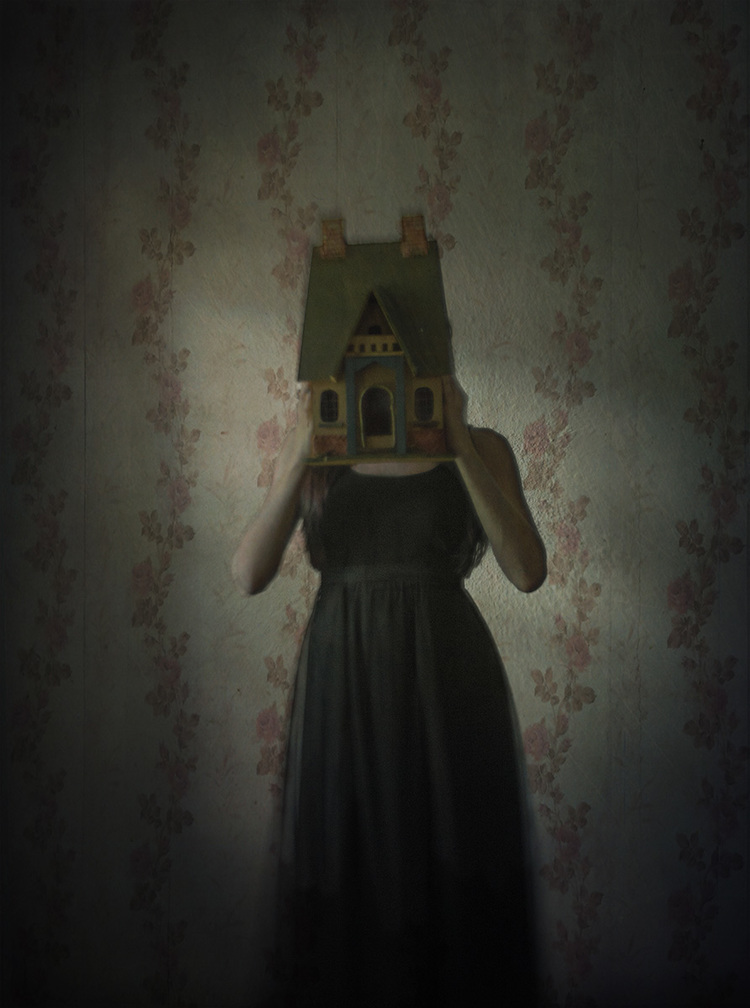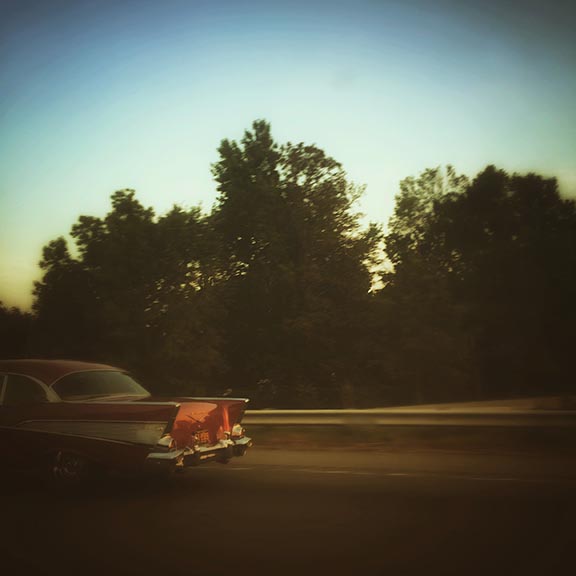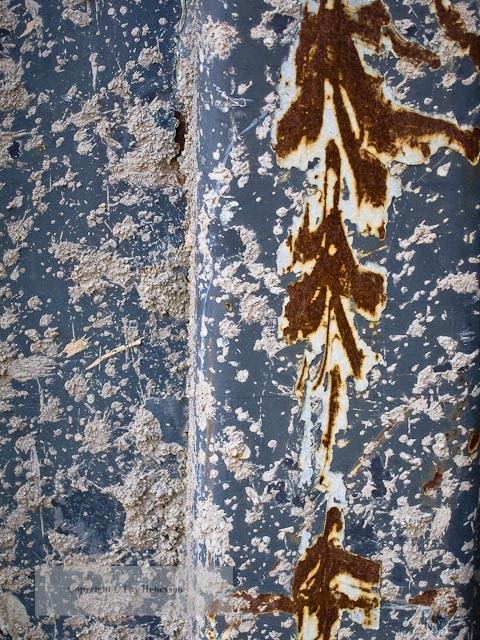
“Prastarbol” by Pat Zalisko, Acrylic on canvas, 48 x 48
I.
The house shudders on its foundation, and in the drafty kitchen, I grip my coffee and brace for the next gust of wind, the next furious rattle of the windows. The winter landscape outside offers little comfort: hundreds of acres of frozen Pennsylvania farm country, a wasteland of brittle grass and cracked earth. For months the wind has gathered and roared over this open space, but not a single flake of snow has accompanied the onslaught. The wind tears apart the desire of any such delicate, symmetrical thing.
At the breakfast table, my two small daughters screech with housebound rage. Quinn, the youngest, heaves her plastic cup to the floor and mashes banana into her hair. Three-year-old Ella bangs her spoon on the table and gouges the wood. There will be no playing outdoors to relieve their frustration; from here the swing set gives shape to the air’s violence: the weathered supports rock back and forth in their postholes, and plastic swings twist and hurl on their chains.
This is not winter. It is despair.
II.
In western New York, along Lake Erie, snowbound winter from October to April is a way of life. Locals consider anything less than twelve inches of snow a nonevent, and weather forecasters don’t say blizzard unless the National Guard has to be called in. Most area kids don’t know the rest of the country considers this kind of winter a nuisance; after all, a good lake-effect snowstorm means no school and terrific sledding. And adults shrug when outsiders gasp about the length of winter, the one hundred inches of annual snowfall. It is a way of life, this snow. Teenagers learn to drive on snow-packed roads. Schoolchildren wear snow pants and heavy boots to school, carrying their everyday shoes in backpacks. And this community of factory workers and truck drivers views snow blowers as unnecessary luxuries. Most everyone, my childhood family no exception, learns to shovel at an early age.
III.
“All right gang, get ’em up and move ’em out.” My father rises from the table and places his breakfast dishes in the sink. “Time to clear the drive.”
It is a bitter, snowed-in Saturday my senior year of high school, and all five of us–Dad, Mom, me, and my younger brothers, Luke and Joe–rush to pull on heavy clothes and boots before heading out into the muffled, white world. The previous night had dumped some twenty inches of snow on our lakefront town, and Don Paul, the most reliable of the local weathermen, warned on the morning news to expect another foot before evening.
We hurry not because we love shoveling, or because we are afraid of more snow piling atop the already impressive drifts. Rather, speed directly relates to easing the pain of an arduous task: the first one to the garage claims the best shovel, a light tool with a gracefully shaped metal scoop. The other shovels are heavier, with spades of varying quality and reliability. But the last person out suffers an ancient, rusting contraption of incredible heft; occasionally its spade falls off under the weight of the snow. When this happens, we don’t drive to Ace Hardware for a new shovel. Not even after three or four mishaps. The unfortunate shoveler bears his or her misfortune in silence and fixes the wreck with a bent nail and wire.
This morning I can’t muster the excitement to compete with my nimble, efficient family; my body feels as if logs are chained to my limbs. This morning the wreck belongs to me. And so I slog through the thigh-deep snowdrifts and hack into them with the godforsaken shovel. My family around me works in silence, bodies bent toward a common goal. Last night, however, the scene was not so unified. I had come home late from having coffee with a friend, and before I could offer up the lie I had concocted, my mother held up her hand and pointed to the saggy, green-upholstered rocker.
“Sit down and be quiet. Eric’s mother called, so don’t even try to tell me otherwise. What the hell were you thinking? The cop clocked him at eighty-five!”
Since she had already spoken with Mrs. Gangloff, the truth was all there was: “Eric wanted to see how fast the old station wagon could go.”
I stopped short of saying I had thought this a worthy experiment. My parents owned two Chevy Caprice wagons as well, and on my own I didn’t have the guts to drive either of those shuddering beasts faster than sixty. I also didn’t tell her that Eric and I had planned to bury the speedometer at 120.
It was a smart omission. Her neck purpled anyway. “You will never ride in a car with that boy again. And you will not see him for a month.”
“But he’s my best friend!” This too was only partially accurate, but my mother knew the half-truth this time. I regretted letting it slip, just days before, that Eric and I might become more than friends. And I was furious that she had turned my confidence into a punishment. I looked over to my father, sitting in his tattered reading chair, but he only stared back and then returned to his newspaper.
My mother continued, her rage and fear filling the space between us. “Maybe he shouldn’t be your best friend anymore. Now go upstairs and go to bed.”
In my parents’ house, face-to-face disobedience was met with greater wrath than stupidity. This, after my father’s belief in the necessity of hard work, was the greatest truth in my seventeen-year-old universe. So I did as I was told. Then I cried myself to sleep.
At some black hour, it began to snow.
IV.
Most of my family memories are bound by work: I am eight years old and picking up twigs and small branches from the endless lawns of my father’s rental properties while my father swelters on the roofs, repairing shingles. I am twelve, fourteen, sixteen and mowing the grass of these properties with Luke every summer weekend. With my mother, I disinfect refrigerators and scrub ovens caked with a year’s worth of failed college-student cooking experiments. I don’t know how old I am when I am first shown how to put down a drop cloth, pry open a paint can, swirl the color with a wooden dipstick until the oil disappears into the clean, uniform pigment, and immerse the brush only one inch into the paint. I then bring the brush up slowly and gently, scrape the excess drips onto the interior rim of the can before even thinking of holding the brush over the drop cloth, much less touching a surface. The names of the paint colors stay constant over the years–China White, Orchard Peach, Coffee Brown.
More than any of this, though, I remember the shoveling. It was the only work we all did together, with the same tool, on the same schedule. We began together, and we finished together.
V.
I fume as I heave snow up off the driveway and toward the stand of willows. I think of all the ways I might sneak out to see Eric; I envision us abandoning our college plans and running away to live in a commune. He can play his guitar and write songs; I will publish some poems and tend a garden. Our lives will be alternative, authentic, far from our shrill parents and the stifling, failed-steel-mill aura of western New York–
And then the scoop falls off the shovel. I look up into the flat, gray sky scratched with willow and maple branches. I hate this shit, this work, this snow. I hate this shitty, shitty place. But I take off my gloves and kneel in the snow to rethread the nail and wire before my fingers ache with the cold. When the nail slides the first time through both the small holes in the metal scoop and the corresponding holes in the wooden handle, I snort my satisfaction. Then I replace my gloves and wind the wire around and around the handle, fastening the nail tight.
When I straighten and brush the snow from my knees, no one notices my triumph; they all have their backs toward me as they move their work away from the house and toward the road. So I start shoveling again. After a few awkward minutes, a physical cadence–dig, life, heave–sets in, and the rhythm mirrors the strange song of my family’s labor, the squeaking bootsoles, the soft thunk of shoveled snow falling on snow pack, the occasional scrape of metal on concrete, a grunt of effort. The sounds break into the muffled whiteness and give the world shape, give it purpose. I keep the rhythm, keep shoveling, and the night with Eric, the confrontation with my mother, fall under the depths of the snow and are replaced by aching muscles and the chill air slicing my lungs. Then, unexpectedly: sky, snow, shovel …
Only the crisp certainty of work exists in the whiteness.
VI.
With all of us shoveling, the job takes over an hour. At its end, like conquerors, we spear our shovels into the enormous piles of snow lining the driveway. We stand in the road and stare at the clear, wet space stretching from the garage to the street. That we have moved what the clouds have dumped upon us is victory over the elements, a pure, human effort born of sweat and a simple tool. Satisfied, we clamber back to the house and warm ourselves sitting by radiators and with tea. Late in the afternoon, my father announces that another foot of snow graces the driveway. I am not about to suffer the broken shovel twice in the same day.
VII.
When I go away to college in Pittsburgh, I assume that winter throughout the northeast is similar to winter in western New York. I pack my heaviest coat, my favorite insulated work boots, and thick scarves that hold up under the harshest wind chills. But my gear never leaves the dorm room. I am devastated to find winter along the three rivers nothing more than a study in two-inch snowfalls. And thanks to bus exhaust and excessive road salt, the thin, white blankets mutate into a brown sludge better suited to hip waders than snow boots. I also learn that such paltry snow fails to muffle a bustling city. Sirens, helicopters, blaring horns, the shouts of the weekend bar crawl–somehow they intensify, everything made more urgent in the slushy chaos.
VIII.
Years later, when Ella is a baby, Dave and I buy a white-shingled house in the southeastern corner of Pennsylvania, ten miles from the Mason-Dixon Line. It is spring, the trees have begun to leaf out, and our yard backs up to a green sea of soybean and corn fields, cow pastures, and horse farms. Farmers spend the sweet, breezy days plowing and planting. My years in Pittsburgh should have cured my naiveté about the impact of geography on the seasons, but still I imagine years of winters here with our children, pulling them in sleds over the snowy expanse of dormant fields. And I anticipate shoveling the driveway–the first driveway I have owned–with my new family. I can nearly hear gasps of delight, snowball-inflicted laughter, the thick scrape of a shovel as it meets the gravel drive.
I am disabused of my romanticism in December. Snow does not fall, but wind and single-digit temperatures leave the yard a forlorn, frosted hardpan. Lying awake in bed at night, I feel the house sway; the wind whistles through the plaster and swirls at the edges of the bedcovers. The heating oil bill leaves me gasping.
Ella, at eighteen months, doesn’t understand why we can’t go outdoors, and when her constant pleas of “Ow-side, ow-side?” don’t produce results, she drags her coat and boots into the living room. One day I break down and dress her in all her cold-weather gear, put on my own hat, coat, scarf, and mittens, and take her out to the front yard where the house partially protects us from the wind. She toddles forward a few steps, but a huge gust comes at us sideways and knocks her down. She struggles in her snowsuit to stand up; the wind knocks her down again. She is determined, though, and reaches the sidewalk where she tries to make her way to our neighbor’s house. Between the houses the wind bites her cheeks, and she cries out in surprise. Then she pitches forward and skins her nose on the pavement. Her screams are nearly noiseless in the wind.
Finally, in February comes the first snow. I am driving home from teaching a night class when it begins, and I am puppyish with excitement: should I wake up Ella when I get home? This is, after all, the first year she will understand snow. We could rush outside and catch snowflakes on our tongues, then celebrate with hot chocolate, cuddle up on the couch, and sing songs until she falls asleep, then tomorrow we will put on snow pants and mittens, and I will make a snow fort for her to play in while I shovel the driveway . . .
Then I notice that the snow doesn’t so much fall as pelt sideways, thrust by massive air currents across the empty fields. The car shudders with each gust, and soon the winding country road whites out. I slow the car to a crawl and hunch over the wheel. It goes on this way for ten miles.
I am almost there, half a mile from the turn into our hamlet of Russellville, when the tires hit black ice. Suddenly I am spinning across the road, into oncoming traffic, and the steering wheel is useless in my hands. Then I register the telephone pole that, with each spin, enters my peripheral vision. I cannot slam into it. We can barely pay the mortgage, let alone car repairs or for an entirely new vehicle. I twist the wheel one last time, and the car’s rear end lurches, grabs, then plows down an embankment and into a cornfield. I am unhurt, and so is the car. I try to open the door, but the wind shoves it closed. I use my feet to press it open again, and once I am outside, the wind nearly slams the door on my fingers. Angry and frightened, I turn my face toward the road, into the stinging snow. Fuck this place. Fuck this horrible, horrible place. Then I clamber up the embankment to flag down help and go home.
IX.
The next morning all the schools are closed. The snow officially amounts to only five inches, but the wind has drifted it into gorgeous, treacherous depths–not only across the major roadways, but halfway up our back door and across the middle of our driveway. And the wind keeps blowing. The thermometer reads ten degrees; the windchill is minus two.
Since Ella’s small fingers would freeze within minutes of taking her outside, Dave stays indoors with her while I take the first shoveling shift, and I tell myself that the challenge of shoveling alone will make up for the wind’s shortcomings. Here is winter as I know it; here is my chance to fight back with my own kind of force.
But I can’t shovel the snow. The wind has hardened the drifts into solid blocks of ice. I trade in the shovel for a pickax, and for a few minutes this isn’t so bad; clearing away ice still counts as victory over nature’s wrath. But I soon realize that working alone out here, my face chapped and my lips blistering, isn’t soothing. It is lonely and hard. The only sound other than the pickax thumping the ice is the whine of the wind in my ears, and the length of the driveway suddenly looks more like forced labor than an energizing physical challenge. I swipe at my eyes, which have begun to tear, with a clumsy, mittened fist. I want to be enjoying this with Dave and Ella, not laboring alone at the edge of this forsaken, stubbled cornfield.
X.
I clean up the mashed banana and throw the cracked plastic cup into the trash. Ella and Quinn beg for TV time, and because it gives us all a measure of peace, I turn on PBS. Elmo’s high-nasal voice carries into the kitchen where I watch the wind gather more force, bending the saplings in the yard to near ninety-degree angles and finally wrapping the swings around the topmost beam of the swing set.
We have been here for three winters now, and I can count on one hand the number of times I have taken up a snow shovel. Though I have no desire to go back to my hometown, I have begun to long for Buffalo lake-effect snowstorms, especially when the wind here howls for days, and the girls and I are sick of being so close to one another. I want the snow to fall steady and straight, to quiet everything down, so we can all trudge outdoors. Then, somewhere in the motion of our bodies and the still of the morning, we will find harmony. And, maybe, I will find a way to belong in this strange, wind-torn place I struggle to call home.
Cate Hennessey’s essays and reviews have appeared in or are forthcoming from Gettysburg Review, Fourth Genre, River Teeth, Southern Indiana Review, PANK, and Tinderbox Poetry Journal. A recent finalist for the Arts & Letters Susan Atefat Prize in Creative Nonfiction, she has also received a Pushcart Prize and been noted in Best American Essays.
“Shoveling Snow” was originally published in Gettysburg Review, 09/2009, Volume 22, Issue 3









